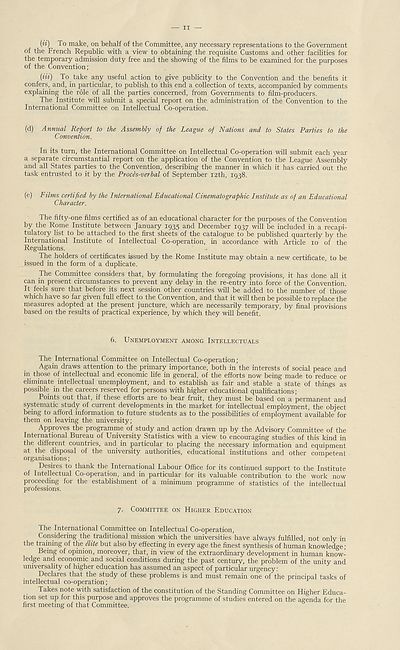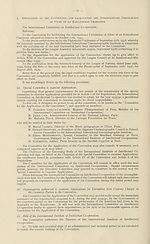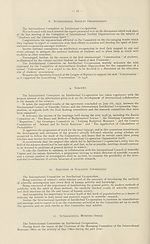International > Report by the committee on the work of its ... plenary session > Twenty first plenary session
(11)
Download files
Complete book:
Individual page:
Thumbnail gallery: Grid view | List view

II
(ii) To make, on behalf of the Committee, any necessary representations to the Government
of the French Republic with a view to obtaining the requisite Customs and other facilities for
the temporary admission duty free and the showing of the films to be examined for the purposes
of the Convention;
(m) To take any useful action to give publicity to the Convention and the benefits it
confers, and, in particular, to publish to this end a collection of texts, accompanied by comments
explaining the role of all the parties concerned, from Governments to film-producers.
The Institute will submit a special report on the administration of the Convention to the
International Committee on Intellectual Co-operation.
(d) Annual Report to the Assembly of the League of Nations and to States Parties to the
Convention.
In its turn, the International Committee on Intellectual Co-operation will submit each year
a separate circumstantial report on the application of the Convention to the League Assembly
and all States parties to the Convention, describing the manner in which it has carried out the
task entrusted to it by the Proces-verbal of September 12th, 1938.
(e) Films certified by the International Educational Cinematographic Institute as of an Educational
Character.
The fifty-one films certified as of an educational character for the purposes of the Convention
by the Rome Institute between January 1935 and December 1937 will be included in a recapi¬
tulatory list to be attached to the first sheets of the catalogue to be published quarterly by the
International Institute of Intellectual Co-operation, in accordance with Article 10 of the
Regulations.
The holders of certificates issued by the Rome Institute may obtain a new certificate, to be
issued in the form of a duplicate.
The Committee considers that, by formulating the foregoing provisions, it has done all it
can in present circumstances to prevent any delay in the re-entry into force of the Convention.
It feels sure that before its next session other countries will be added to the number of those
which have so far given full effect to the Convention, and that it will then be possible to replace the
measures adopted at the present juncture, which are necessarily temporary, by final provisions
based on the results of practical experience, by which they will benefit.
6. Unemployment among Intellectuals
The International Committee on Intellectual Co-operation;
Again draws attention to the primary importance, both in the interests of social peace and
in those of intellectual and economic life in general, of the efforts now being made to reduce or
eliminate intellectual unemployment, and to establish as fair and stable a state of things as
possible in the careers reserved for persons with higher educational qualifications ;
Points out that, if these efforts are to bear fruit, they must be based on a permanent and
systematic study of current developments in the market for intellectual employment, the object
being to afford information to future students as to the possibilities of employment available for
them on leaving the university;
Approves the programme of study and action drawn up by the Advisory Committee of the
International Bureau of University Statistics with a view to encouraging studies of this kind in
the different countries, and in particular to placing the necessary information and equipment
at the disposal of the university authorities, educational institutions and other competent
organisations;
Deshes to thank the International Labour Office for its continued support to the Institute
of Intellectual Co-operation, and in particular for its valuable contribution to the work now
proceeding for the establishment of a minimum programme of statistics of the intellectual
professions.
7. Committee on Higher Education
The International Committee on Intellectual Co-operation,
Considering the traditional mission which the universities have always fulfilled, not only in
the training of the elite but also by effecting in every age the finest synthesis of human knowledge ;
Being of opinion, moreover, that, in view of the extraordinary development in human know¬
ledge and economic and social conditions during the past century, the problem of the unity and
universality of higher education has assumed an aspect of particular urgency;
Declares that the study of these problems is and must remain one of the principal tasks of
intellectual co-operation;
Takes note with satisfaction of the constitution of the Standing Committee on Higher Educa¬
tion set up for this purpose and approves the programme of studies entered on the agenda for the
first meeting of that Committee.
(ii) To make, on behalf of the Committee, any necessary representations to the Government
of the French Republic with a view to obtaining the requisite Customs and other facilities for
the temporary admission duty free and the showing of the films to be examined for the purposes
of the Convention;
(m) To take any useful action to give publicity to the Convention and the benefits it
confers, and, in particular, to publish to this end a collection of texts, accompanied by comments
explaining the role of all the parties concerned, from Governments to film-producers.
The Institute will submit a special report on the administration of the Convention to the
International Committee on Intellectual Co-operation.
(d) Annual Report to the Assembly of the League of Nations and to States Parties to the
Convention.
In its turn, the International Committee on Intellectual Co-operation will submit each year
a separate circumstantial report on the application of the Convention to the League Assembly
and all States parties to the Convention, describing the manner in which it has carried out the
task entrusted to it by the Proces-verbal of September 12th, 1938.
(e) Films certified by the International Educational Cinematographic Institute as of an Educational
Character.
The fifty-one films certified as of an educational character for the purposes of the Convention
by the Rome Institute between January 1935 and December 1937 will be included in a recapi¬
tulatory list to be attached to the first sheets of the catalogue to be published quarterly by the
International Institute of Intellectual Co-operation, in accordance with Article 10 of the
Regulations.
The holders of certificates issued by the Rome Institute may obtain a new certificate, to be
issued in the form of a duplicate.
The Committee considers that, by formulating the foregoing provisions, it has done all it
can in present circumstances to prevent any delay in the re-entry into force of the Convention.
It feels sure that before its next session other countries will be added to the number of those
which have so far given full effect to the Convention, and that it will then be possible to replace the
measures adopted at the present juncture, which are necessarily temporary, by final provisions
based on the results of practical experience, by which they will benefit.
6. Unemployment among Intellectuals
The International Committee on Intellectual Co-operation;
Again draws attention to the primary importance, both in the interests of social peace and
in those of intellectual and economic life in general, of the efforts now being made to reduce or
eliminate intellectual unemployment, and to establish as fair and stable a state of things as
possible in the careers reserved for persons with higher educational qualifications ;
Points out that, if these efforts are to bear fruit, they must be based on a permanent and
systematic study of current developments in the market for intellectual employment, the object
being to afford information to future students as to the possibilities of employment available for
them on leaving the university;
Approves the programme of study and action drawn up by the Advisory Committee of the
International Bureau of University Statistics with a view to encouraging studies of this kind in
the different countries, and in particular to placing the necessary information and equipment
at the disposal of the university authorities, educational institutions and other competent
organisations;
Deshes to thank the International Labour Office for its continued support to the Institute
of Intellectual Co-operation, and in particular for its valuable contribution to the work now
proceeding for the establishment of a minimum programme of statistics of the intellectual
professions.
7. Committee on Higher Education
The International Committee on Intellectual Co-operation,
Considering the traditional mission which the universities have always fulfilled, not only in
the training of the elite but also by effecting in every age the finest synthesis of human knowledge ;
Being of opinion, moreover, that, in view of the extraordinary development in human know¬
ledge and economic and social conditions during the past century, the problem of the unity and
universality of higher education has assumed an aspect of particular urgency;
Declares that the study of these problems is and must remain one of the principal tasks of
intellectual co-operation;
Takes note with satisfaction of the constitution of the Standing Committee on Higher Educa¬
tion set up for this purpose and approves the programme of studies entered on the agenda for the
first meeting of that Committee.
Set display mode to:
![]() Universal Viewer |
Universal Viewer | ![]() Mirador |
Large image | Transcription
Mirador |
Large image | Transcription
Images and transcriptions on this page, including medium image downloads, may be used under the Creative Commons Attribution 4.0 International Licence unless otherwise stated. ![]()
| League of Nations > International > Report by the committee on the work of its ... plenary session > Twenty first plenary session > (11) |
|---|
| Permanent URL | https://digital.nls.uk/195386196 |
|---|
| Attribution and copyright: |
|
|---|---|
| Shelfmark | LN.XII.5 |
|---|---|
| Shelfmark | LN.XII |
|---|
| Description | Over 1,200 documents from the non-political organs of the League of Nations that dealt with health, disarmament, economic and financial matters for the duration of the League (1919-1945). Also online are statistical bulletins, essential facts, and an overview of the League by the first Secretary General, Sir Eric Drummond. These items are part of the Official Publications collection at the National Library of Scotland. |
|---|---|
| Additional NLS resources: |
|

